They embody many conflicts: they were educated by two distinctly different philosophies; they lived and worked in two completely dissimilar environments. But now, they are traveling between these two conflicting worlds and trying to be the bridge that connects them together. Some of them have achieved success, and it is no mean feat. In today's Business Life, some overseas returnees will share with you their stories on the homeward journey, some bitter, while some sweet.
Henry Wang, chairman of a consulting company that provides project information between China and the world, regards himself as one of the new generation of Chinese overseas returnees.
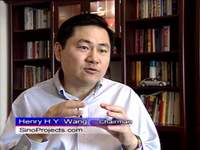 Henry H.Y. Wang
Henry H.Y. Wang
Chairman of SinoProjects.com
President of WRSA Chamber of Commerce of China
1984-1985 MBA, University of Windsor, Ontario, Canada
Henry H.Y. Wang: The new generation cannot bring a lot of capital like older generation does. But they bring back the value, the technology, the human talents. So I think this generation needs to be more emphasized.
Gordon Wang, China market development manager of Cisco Systems, hopes his management skills learnt in North America could bring China more benefits.
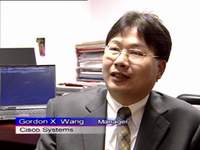 Gordon X. Wang
Gordon X. Wang
Manager, Cisco System
1991-1994 Master, Technical University of Nova Scotia, Halifax, Canada
Gordon X. Wang: I have learnt a lot of management skills, how to conduct technical management, and develop leadership to drive the team to work, to drive them as a team to develop products.
Xu Zhimin, general manager of a high-tech company providing remote control products, hopes China will be a leader in high-tech fields around the world with the help of their efforts.
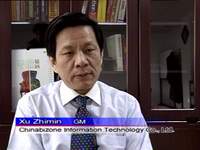 Xu Zhimin
Xu Zhimin
GM, ChinaBizone Information Technology Co. Ltd.
1986-1991 PhD, Northeastern University, Massachusetts, USA
Xu Zhimin: We also have us coming back to China. We are starting to produce high-tech stuff, which is also exported to the US. So in one way I feel maybe within 5 years instead of only seeing Chinese cheap goods in the US, we'll see also high-tech goods shipped to the US.
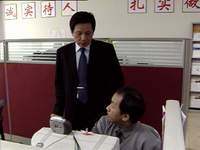 As a Chinese who grew up in China with 20 years of local education and living experiences, they went abroad for further education. Now, they are painting different career maps, but they share the same life experiences, that is, going abroad and coming back. So why do they choose the road of returning?
As a Chinese who grew up in China with 20 years of local education and living experiences, they went abroad for further education. Now, they are painting different career maps, but they share the same life experiences, that is, going abroad and coming back. So why do they choose the road of returning?
Xu Zhimin: Being a Chinese, it doesn’t matter if you are American citizen or Chinese citizen, you'll feel guilty if you find that you don’t do anything to your country. At least, being a participant, I'm not talking about contribution, but at least to offer anything I have.
 But the road of coming back is not so easily chosen as people imagine. They have to learn sacrifice as well. Gordon left his comfortable family life in a two-million-US-dollar house in America, and now leads the busy working life here in China.
But the road of coming back is not so easily chosen as people imagine. They have to learn sacrifice as well. Gordon left his comfortable family life in a two-million-US-dollar house in America, and now leads the busy working life here in China.
Henry also met the same hard life. At the beginning of the business, they had to deal with Chinese businesspeople during the day and communicate with North America at night due to the time difference. They were working round the clock every day. However, busy life is only one part of the thorny road. The different way of doing business is perhaps their biggest headache.
Henry H.Y. Wang: At that time, we take a long time to establish: six months to set up an office in early 1990s; two months to get computers through the airport to customers. Even if we tried to install a fax machine, there's a license needed. So there are some difficulties that people in west can't imagine.
This headache has been much alleviated during the past decade since China's business environment has undergone immense changes. For these returnees, changes mean opportunities.
Xu Zhimin: Every level in government has given us supports, which include business management, training, also something like financing for you to start business here. I think this is really good, for you have left the country for so many years, you don't know anything about the regulations and policies.
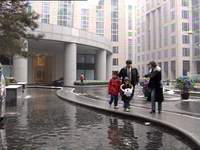 Although their working environment is being improved rapidly, they're still challenged by another big issue: missing their families. Many overseas students have already a settled family life abroad. Coming back means they have to leave their families. As traditional Chinese people, they put the education for kids on the foremost priority.
Although their working environment is being improved rapidly, they're still challenged by another big issue: missing their families. Many overseas students have already a settled family life abroad. Coming back means they have to leave their families. As traditional Chinese people, they put the education for kids on the foremost priority.
Henry H.Y. Wang: I bring them to China a few times a year to study different Chinese tradition and culture. But they receive the regular education in North America, in Canada. They also got chance to see the rest of the world. They travel to Europe, to Japan and to Korea.
They have also paid much attention to the differences in the education systems between China and the countries they have lived and worked in.
Henry H.Y. Wang: When they stay in North America, they can receive an open, creative, and more all-round development. In China, sometimes the education is more rigid, traditional, and emphasizes a lot on learning and memorizing.
Like any common Chinese, they focus on family values, making all efforts to bring up their children well and providing their kids with the best education as possible as they can. After comparing both different educational systems, they decide it is good for kids to be exposed to the multicultural environment when they are young. So they leave their kids abroad.
Gordon X. Wang: They teach what students like. It is not just to force them to learn something they don't want to learn. So comparing with our education system, we feel it's very hard for people like us, who want to go back to China to work, to take our children back to China.
 Perhaps that's one of the main reasons why many other overseas students hesitate when they consider coming back to China. For them, China should initiate some open and creative concepts in the education system.
Perhaps that's one of the main reasons why many other overseas students hesitate when they consider coming back to China. For them, China should initiate some open and creative concepts in the education system.
Gordon X. Wang: Education reform is very important for the country. So how we learn from North America, how we take our advantages and learn something good from North America are really important for us.
In spite of difficulties ahead, they insist on coming back. Their working experiences abroad enable them to do business in an international setting. When they begin their business in China, they find large discrepancies in the value systems and traditional thinking of people doing business.
Henry H.Y. Wang: In China, when you come back to do business, people always say, “oh, we have to Yanjiu Yanjiu,” which means they have to study this. Actually, that means they want to hold it for a while, but they don't say it directly. While in North America, people are quite business-oriented. They want to know the result right away.
For these overseas returnees, the most valuable things they have learnt abroad are the advanced management concepts. Chinese are well known for their capabilities of learning and developing technologies. What they lack is the spirit of team working and concepts of leadership, the way to manage a team.
Gordon X. Wang: In America, they manage their business by using the method of so-called science business management. What happens in China? We use the method of people control people. Those are very different ideas.
 With these international experiences of doing business, these overseas students have become the most vital and dynamic part of China's human talent pool. Their returning has attracted attention from all circles. The society is trying to give them all way round support to start up their business, including financial assistance. But they have their own comments on this.
With these international experiences of doing business, these overseas students have become the most vital and dynamic part of China's human talent pool. Their returning has attracted attention from all circles. The society is trying to give them all way round support to start up their business, including financial assistance. But they have their own comments on this.
Xu Zhimin: There's only one comment I’d like to make on, that is, the financial support to every company if they're overseas students or overseas professionals. Basically speaking, they have even distributed the funds to nearly every company if they apply.
Gordon X. Wang: Can we get involved in some political career? Can we develop ourselves to be the high-level government official? Even though we have a visa status as American and North American status.
They went abroad one after another in the past two decades for new styles of studying and working. People around admired their brave decisions. But to everyone's surprise, they are now casting eyes homeward and returning in waves. They travel in two completely different cultures. All the time, they attract ceaseless controversial discussions in the society with their bold actions. They are actually common people, just looking for a most suitable place to bridge China and the world.
|